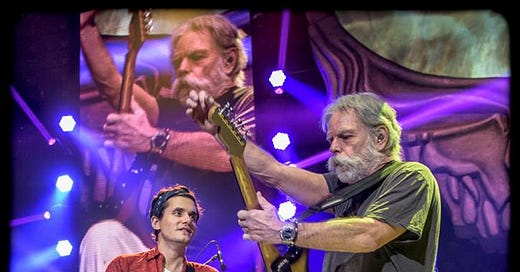John Mayer on Bob Weir: "He’s a total savant."
In this 2016 interview, John Mayer broke down some of the idiosyncrasies of his Dead and Company partner, Bob Weir.
This is something of a placeholder post as I write up my experience over the weekend at the Dead & Company Sphere shows, which sent me back to my archives to review what I’ve written about them in the past. In 2016, I interviewed John Mayer about working with Bob Weir as part of a Guitar World cover story on Weir. That is below. this is part of what I wrote in 2015 review of a very early D&C show at Madison Square Garden. Most of it holds up well.
Dead & Company is a fascinating venture. Oteil and Mayer are bringing a new energy and a slightly different direction to the music. While Mayer has clearly embraced and ingested the music of the Dead, he is not shying away from sounding like himself and I think that's a good thing. The catalog is sturdy enough to invite reinterpretation and any sincere effort can work. Notably, Weir seemed to be really enjoying the energy radiating out from his right flank. He sang and played at a very high level, and you could really hear his guitar, which has not always been the case.Mayer's guitar alpha and omegas are Clapton and Stevie. He helped make "Cold, Rain and Snow" sound like Backless-era Clapton, which works beautifully for me, though I know some Heads feel otherwise. Oteil provided stone cold grooves that also represent a new direction on many songs. He nailed the complicated passages of "Slipknot" and "The Other One," and it was fun to hear him steer loping tunes like "Tennessee Jed" and "He's Gone" where the groove is distinctive but elastic, more subject to personal interpretation. Oteil and Chimenti filled in the holes, often working in tandem to play and high and low around the main melody and guitars and keep the music sturdy.
Please support Low Down and Dirty by subscribing and also sharing this post!
How would you describe Bob's guitar style?
Bob’s approach to guitar playing is sort of like Bill Evans’ approach to piano was. He’s a total savant. His take on guitar chords and comping is so original, it’s almost too original to be fully appreciated until you get deep down into what he’s doing. Bob doesn’t hear 1-3-5 when it comes to stacking a chord. He thinks in substitutions. I think he’s invented his own vocabulary where a lot of times the root note isn’t at the bottom of the chord, it’s somewhere in the middle of it. It’s a joyous thing to play along with.
Were there any elements of his playing that you didn't or couldn't fully appreciate before learning the Dead catalogue and playing him with nightly?
Absolutely. Until you play with Bob in real time, you don’t understand how fun and vibrant it is to play with and against him. What I mean by that is that there’s this perfect push/pull happening, where he knows how to flow with you and then kind of swirl around you. That’s what makes the guitar section of the band sound so huge; it’s like he’s figured out precisely how to "fan out" against the backdrop of the rhythm section. He’s the harmonic engine of the band.
How has playing with Bob impacted your own playing?
I’ve certainly learned how to sit and let the music happen for a bit without pushing it forward. It was a huge education for me to go back and listen to tapes where I thought we had held too long on one vamp or idea, only to find that we hadn’t even gotten started diving into it at the point I would have thought there was nothing left to discover. Bob’s a gold prospector that way. And he’s brave and patient and fearless, and that’s been a ton of fun to follow his lead.
The paperback edition of my fourth book, Brothers and Sisters: the Allman Brothers Band and The Album That Defined The 70s, was recently released by St. Martin’s Press. It was the third consecutive one to debut in the New York Times Non-Fiction Hardcover Bestsellers List, following Texas Flood: The Inside Story of Stevie Ray Vaughan and One Way Out: The Inside History of the Allman Brothers Band. My first book, Big in China: My Unlikely Adventures Raising a Family, Playing the Blues and Becoming a Star in Beijing, about my experiences raising a family in Beijing and touring China with a popular original blues band, was optioned for a movie by Ivan Reitman’s Montecito Productions. I am also a guitarist and singer with two bands, Big in China and Friends of the Brothers, the premier celebration of the Allman Brothers Band.






So glad you got to see some of the sphere shows! Thanks as always for sharing your insights from inside. A while back you said that Bobby Weir is a National treasure. That stuck with me and I couldn't agree more as a 50+-year passenger on the Dead train.
BTW, anyone who's not appreciative of John Mayer's critical role in this just doesn't get it, IMO. He is as sincere and heartfelt as anyone could possibly be, standing up there in the space once occupied by one of the greatest of all time. Every time I listen to John playing, I feel like it's an homage to Jerry while still being John's own heart out there on his sleeve. And of course Mickey, up there acting like a teenager, Oteil his otherworldly self, and Jeff defying the GD keyboard curse. And last but not least Jay Lane, a tremendous addition to the band who I've enjoyed seeing play with Wolfpack. I only wish I could make it out there for one of the shows between now and May 17th. Dead Forever!
:)